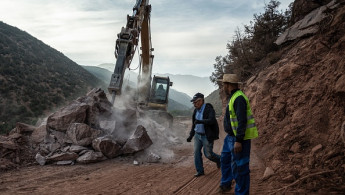Desperation and grief in Moroccan villages after earthquake
Two days after the strongest earthquake to hit Morocco in over 120 years, families are still mourning their lost ones as they try to survive the aftermath.
In the ruins of her once-childhood home, Fatima, a 16-year-old girl, searches for anything valuable: a pillow for her wounded aunt, a Quran for her grandmother, and her 5-year-old brother's school backpack, as he still is unaware that his village's school lies in ruins.
This has become Fatima's daily quest since the quake hit her village, Moulay Brahim, a province of Al Haouz, where the earthquake's epicentre was located.

At 11:11 pm on Friday, 8 September, the ground shook with a force few had ever felt, thundering through the vulnerable villages of Al Haouz and Taroudanet.
"We just finished dinner. We felt the earth heavily shaking. We didn't know what was happening. First, we thought 'it's doomsday,' but our first instinct was to try to leave the house," Fatima remarked to The New Arab.
In Moulay Brahim, 40 kilometres away from Marrakech, the damage was immense.
Homes crumpled, and walls were reduced to rubble. Hundreds suffocated under clay brick and cinder blocks that could stand no chance against a magnitude of 6.8.
"I saw my brother getting crushed by the wall of the house facing us as soon as he left our house running," Saida described Friday's events.
"Me, my mom and my niece were stuck on the second floor. We had to step on the rubbles under which my bother and his wife were stuck," Saida added, trying to hold back her tears.
Petrified, the habitants of the village sought safety in the main street. When the panic eased, they went back to what used to be their homes to clear debris with their bare hands and started pulling out bodies, one after another.
Most of the deaths, at least 2,497 so far, were in Marrakech and five provinces near the epicentre, with at least 2,476 more people injured, the Interior Ministry reported Monday morning.
In Moulay Brahim, at least 40 people died, and locals say some bodies might still be under the rubble.
On Saturday, a dozen blanket-covered bodies were buried in the hillside cemetery in the village after a brief Islamic funeral.
Families and friends came from other cities to pay respect and help their relatives who were left to sleep in the wild under the breeze of September.
"We live in Marrakech. Our home there was damaged, but at least we still have food and a roof. Our relatives here are hit so badly. It's hard to try to survive and mourn both at the same time," said Khadija in Tachelhit to TNA as she held onto a basket stuffed with goods she brought to her family.
Moulay Brahim, a village of fewer than 3,000 people, was a popular tourist attraction with its stunning vistas and proximity to Marrakech.
Today, its colourful small hotels and cafes with hopeful names and slogans are too fragile to safely enter and appear at risk of toppling by another tremor, which authorities warn may happen in the upcoming days.
In the village square, villagers built makeshift tents from the covers and the mats they could save, or they were offered when the first air rescuers arrived over the weekend.
Famished villagers are asking for help, saying despite the several donations convoys coming to the area, food has yet to be distributed to the victims.
"They gave us biscuits and a few loafs of bread yesterday. But we are starving here. They should at least feed the children," Khadija, a pregnant woman, told TNA.
A local authority member in charge of the food stock said to TNA that they still don't have enough "to feed everyone."
"Inshallah, by tomorrow morning, we will have consistent meals, patience, please everyone," he told the angry crowd that burst into the tents, demanding more aid.
Nearby towns and villages such as Azrou, Asni and Amezmiz also desperately need food, tents and electrical generators as most villagers lost contact with their relatives and the world after their phones died.




 Follow the Middle East's top stories in English at The New Arab on Google News
Follow the Middle East's top stories in English at The New Arab on Google News

![A group of Palestinians, foreign and Israeli activists gather to participated in an olive picking event on the land in the town of Battir, which is under threat of confiscation by Israel in Bethlehem, occupied West Bank on 8 November 2024. [Getty]](/sites/default/files/styles/image_330x185/public/2182930803.jpeg?h=199d8c1f&itok=__0LgGsa)
